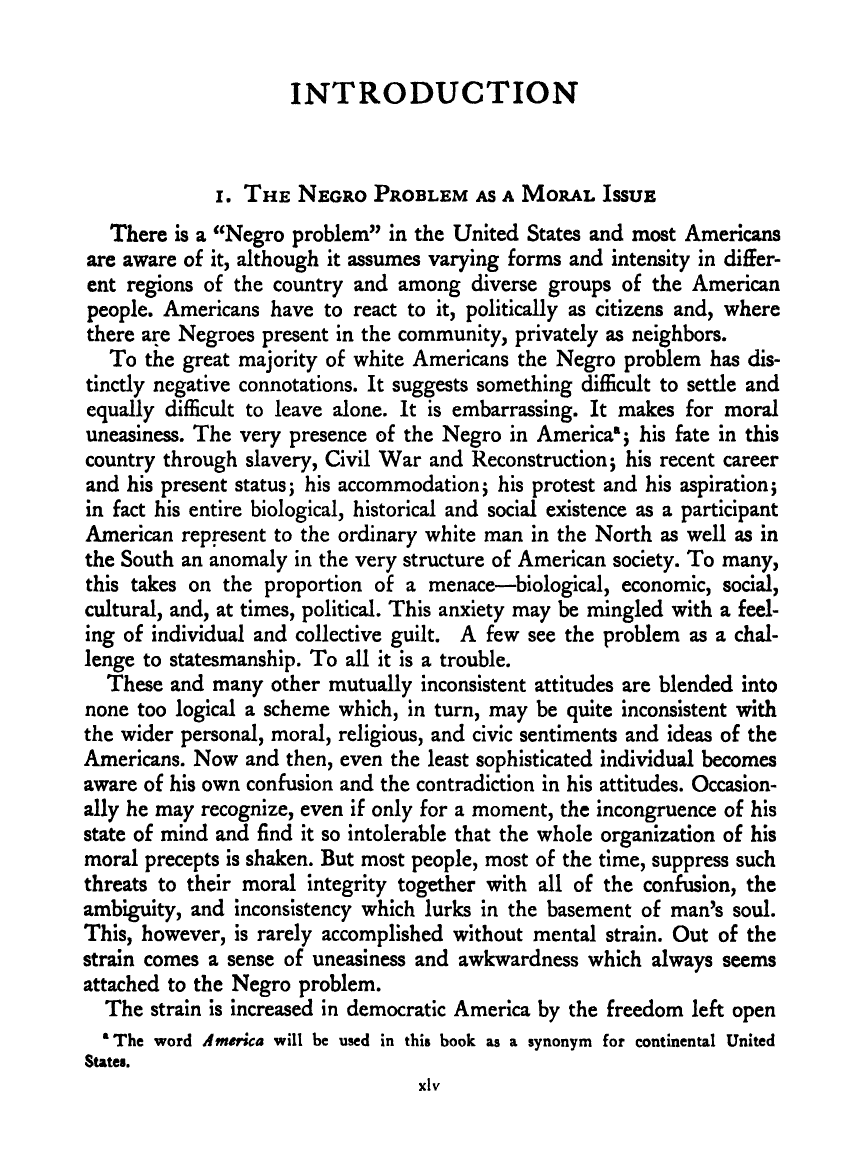 Note:
Gunnar Myrdal died in 1987, less than 70 years ago.
Therefore, this work is protected by copyright,
restricting your legal rights to reproduce it.
However, you are welcome to view it on screen, as you do now.
Read more about copyright.
Note:
Gunnar Myrdal died in 1987, less than 70 years ago.
Therefore, this work is protected by copyright,
restricting your legal rights to reproduce it.
However, you are welcome to view it on screen, as you do now.
Read more about copyright.

Full resolution (TIFF)
- On this page / på denna sida
- Introduction
- 1. The Negro Problem as a Moral Issue

<< prev. page << föreg. sida << >> nästa sida >> next page >>
Below is the raw OCR text
from the above scanned image.
Do you see an error? Proofread the page now!
Här nedan syns maskintolkade texten från faksimilbilden ovan.
Ser du något fel? Korrekturläs sidan nu!
This page has been proofread at least once.
(diff)
(history)
Denna sida har korrekturlästs minst en gång.
(skillnad)
(historik)
INTRODUCTION
1. The Negro Problem as a Moral Issue
There is a “Negro problem” in the United States and most Americans
are aware of it, although it assumes varying forms and intensity in
different regions of the country and among diverse groups of the American
people. Americans have to react to it, politically as citizens and, where
there are Negroes present in the community, privately as neighbors.
To the great majority of white Americans the Negro problem has
distinctly negative connotations. It suggests something difficult to settle and
equally difficult to leave alone. It is embarrassing. It makes for moral
uneasiness. The very presence of the Negro in America[1]; his fate in this
country through slavery, Civil War and Reconstruction; his recent career
and his present status; his accommodation; his protest and his aspiration;
in fact his entire biological, historical and social existence as a participant
American represent to the ordinary white man in the North as well as in
the South an anomaly in the very structure of American society. To many,
this takes on the proportion of a menace—biological, economic, social,
cultural, and, at times, political. This anxiety may be mingled with a
feeling of individual and collective guilt. A few see the problem as a
challenge to statesmanship. To all it is a trouble.
These and many other mutually inconsistent attitudes are blended into
none too logical a scheme which, in turn, may be quite inconsistent with
the wider personal, moral, religious, and civic sentiments and ideas of the
Americans. Now and then, even the least sophisticated individual becomes
aware of his own confusion and the contradiction in his attitudes.
Occasionally he may recognize, even if only for a moment, the incongruence of his
state of mind and find it so intolerable that the whole organization of his
moral precepts is shaken. But most people, most of the time, suppress such
threats to their moral integrity together with all of the confusion, the
ambiguity, and inconsistency which lurks in the basement of man’s soul.
This, however, is rarely accomplished without mental strain. Out of the
strain comes a sense of uneasiness and awkwardness which always seems
attached to the Negro problem.
The strain is increased in democratic America by the freedom left open
[1] The word America will be used in this book as a synonym for continental United
States.
<< prev. page << föreg. sida << >> nästa sida >> next page >>
Project Runeberg, Sat Dec 9 01:31:31 2023
(aronsson)
(diff)
(history)
(download)
<< Previous
Next >>
https://runeberg.org/adilemma/0047.html


Note: Gunnar Myrdal died in 1987, less than 70 years ago. Therefore, this work is protected by copyright, restricting your legal rights to reproduce it. However, you are welcome to view it on screen, as you do now. Read more about copyright.
